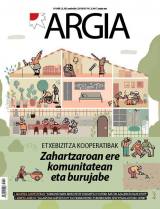Millennial Doesn't Kill Paper Book
- The video killed the radio star: The Buggles group announced in the late 1970s the change that audiovisual media introduced into the music industry until then, when MTV had not yet been created. The e-book was also going to die of paper, but ten years after the e-book readers were commercialized, the announcement has not been kept.

What happens in the United States marks a trend in these issues and, looking beyond the ocean, the numbers do not lie: the sale of digital readers is going to fall. Last year has been a good year to see the depth of this trend, as according to data provided by the country’s publishing association, e-book sales have fallen by almost 20%, while paper sales have grown again. It's becoming a little bit clear that in 2007, the predictions that Amazon made when it launched the Kindle into the market have not been met.
With considerable marketing, the new star product of e-book readers appeared in the media saying it would be the “iPod of literature”, foreseeing a phenomenon similar to that which revolutionized the music industry in the field of letters. The times were not bad enough to start a harsh reconversion in this industry, remember when the shock of the financial and economic crisis erupted and the consequences that some strategic decisions had at that time of confusion in the lives of all. But ten years later, the ever-present book is still there. It has resisted. Why?
Ten years ago, paper books announced the fate of dinosaurs. These forecasts have not been met and the most technologized generation has
to do with
The digital book may have many motives behind the book not being replaced, but the most surprising of them is called a generation: millennials. People born in the 1980s and 1990s have often been caricaturized in the media as hyper-technologized aliens, highlighting that they have customs very different from those of earlier ages: compulsive users of social networks, unable to pay attention to something for more than ten seconds, who only seek immediate stimulus... However, the reality behind the media discourse always has more folds: Naomi S. The language teacher Baron carried out a study on the reception of both supports among young people to university students from the United States, Slovakia, Japan and Germany. The results of the research were published in 2016 and did not offer major possibilities for transactional interpretation: 92% were in favor of paper.
Baron explained to the media The New Republic that students prefer to read paper because it has no distraction – and digital media does – if you are studying, you concentrate more easily in front of a paper book. The second main argument in favor of the always book is the physique: with the screen, your eye gets tired and causes a headache if you have it in front for a long time – and if you have to read it, you will have to spend a few hours, right?
Book porn: touch, oler, show
Among the results obtained by the study there are also curious data, such as that 10% of Slovak students responded that they liked the smell of paper books. “There is a physical, tangible, kinesthetic component in reading,” Baron explained in the aforementioned interview. As a university professor, he was concerned: “We’re not listening,” he said, “we’re not worried about asking our students what they think.”
Not what they do, because the elderly person filled with prejudices receives some surprises entering the social networks of the young readers. Many of them claim the aesthetics of paper; somehow, they produce book pornography on social media. For example, on Instagram, whose main function is to share photos with friends who suggest that the lives of users are wonderful, in the hashtag #bookstagram there are sixteen million photos tagged. Most of the time books appear, often accompanied by a coffee or an infusion, which are presented as something nice to see a novel or book of poems. It's related to well-being and calmness, it's something that generates warm feelings. And that's related to paper, because it's much harder to suggest the same thing with a cold electronic reader.
In the face of the catastrophist predictions that wished analogue books the fate of the dinosaurs, in the last decade it seems that paper has regained its value; and has started to say something more as a product, gradually overcoming the discourse that began to dominate it, “the only cultural support that has remained out of digital modernity”: in the midst of crisis and under the threat of electronic readers, the editorials have invented to publish books with more detail.
Maybe that's one of the keys to the sparse resistance of paper: before everyone went to the Internet, what was inside was the primary value of a book, they were bought by a hobby of reading. It is possible that many current shoppers value both content and color, touch, typography used on the front page, concisely, the complete design and, even if unconsciously, the viral performance they can get in the networks of this book.
Explained thus seems a quite frivolous attitude, but we must not forget the social logic that Pierre Bourdieu explained in La Distinction: in one field the individual tends to differentiate himself from others to achieve recognition, but without becoming marginalized. Follow a fashion with some personal touches. The variety of colours of bookshelves filled with books of all life has a lot to gain from the screens produced in series.
Baditu –besteren artean– bi gabezia euskal literaturak: liburu elektronikoen urritasuna eta literatur lanen ibilbide laburra. Aritz Brantonek Booktegi ataria sortu du joera horiek aldatzeko. Euskarazko lanak formatu digital zainduan eta doan eskaintzen ditu bertan... [+]













